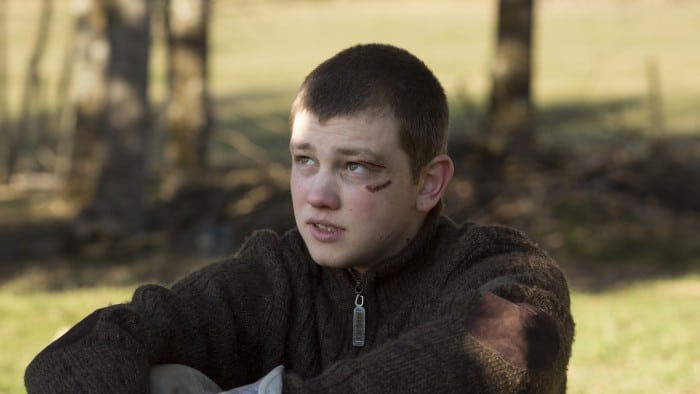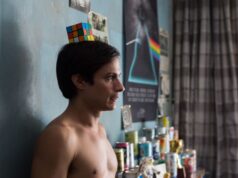Fifth-day coverage of the 68th Berlin International Film Festival with reviews of the French film The Prayer and the Swedish The Real Estate
The Prayer (La Prière)
Thomas (Anthony Bajon) is a young man who joins an isolated religious community of former drug addicts living in a remote house in the French mountains. When we see him for the first time, he has a bruise around his left eye and looks like he is going to hell — a place where he won’t have any access to alcohol, drugs or women, and where the days consist mainly of regular prayer and hard labor in the fields. This can be quite difficult for newcomers, but each person gets to have a “guardian angel” — or a closer friend — to guide them in moments of hardship. Friendship is very important in this place, and we notice that when Pierre (Damien Chapelle) sits by Thomas’ bed and prays for him as the boy struggles with abstinence.
Although initially aggressive and reluctant to be part of the community and accept the rules (like when he is told he must apologize for not following them), Thomas soon begins to adapt and becomes integrated in their way of living, later helping the others prepare a staging of Lazarus in summer. While it would be easy to imagine that these guys are a bunch of fanatic ex-junkies, this is actually not the case, since we see them singing, having fun and even making jokes involving Jesus (right before praying). The linear structure is lucid in the way it carefully lets us in on what life at this place is like while exploring Thomas’ motivations for trying to believe in what he is told about God and Jesus.
And trying is the word here, for no matter how hard it is for some, their hearts may simply not be there. Even as Thomas learns all the psalms and is encouraged like his companions to express his feelings, he is held back. People’s paths are not just one, and it takes a lot of faith (not only religious) to embrace a monastic life — especially when you perform tasks that can be seen as completely pointless, such as digging a hole in the snow in the middle of winter only to fill it up right after. But being lost is too scary, and Bajon is a great actor who conveys with full commitment the pangs of fear and doubt, as well as the guilt of not being able to devote yourself. We feel a strong urge to hug him and tell him everything is going to be fine.
For others, like Pierre, it’s difficult not to lose conviction — and his new life has become a safe haven and a prison, since he doesn’t want to leave (back to his wife and child who wait outside) for fear of going back to the drugs. Some of them talk about their experiences in touching speeches that reveal a lot about the comfort they seek in this Catholic community — and the fact that the guys and girls are kept apart and must receive permission for courtship before marriage shows how conservative this place is. It takes love to embrace it, and Thomas must choose.
With a wonderful appearance of Hanna Schygulla as a nun who seems to read what Thomas hides in his heart, The Prayer also pays attention to details that make it feel even more realistic (like someone yelling “Louder!” during a speech). And the film’s beautiful conclusion — to the sound of sacred music — is perfect in the way it shows that the sacred can also be found in life.
The Real Estate (Toppen av ingenting)

Swedish humor tends to be quite peculiar and centered on characters that make no effort to be likable, inspiring or relatable. The Real Estate is one of those films, with a wacky, misanthropic protagonist who embarks on a personal crusade of madness after her life spirals out of control. This is definitely not your typical character study, much less a tale of redemption (hell, no way), rather a strange comedy that wants to follow a woman going nuts against the world and those around her. Does that sound like your cup of tea? I’m pretty sure a lot of people will hate it, but if seen as the unpretentious nutcase job it wants to be, it can be enjoyable.
The protagonist in question is Nojet (Léonore Ekstrand), a 68-year-old woman who returns from Spain to Stockholm after she inherits from her father one of his apartment buildings in the city. Used to a life of luxury, she finds the building completely run down and poorly managed by her demented half-brother and his lunatic son, who have been subletting the entire seventh floor to immigrants who have no legal contract. Desperate to sell the building as soon as possible before the tenants form a co-op, she asks advice from her father’s lawyer, who is also a music producer and is organizing some sort of gala for homeless people (yeah, I know).
With a plot that plays like an inverted Aquarius (2016), The Real Estate is able to make us laugh at Nojet’s lack of tact toward people, which is also a merit of the actress, who can be very funny playing a bitch. Nojet rehearses speaking to those tenants and enters their apartments without giving a damn whether they like it or not. It is obvious that directors Axel Petersén and Måns Månsson want to make this film completely surreal, investing constantly in close-ups, shallow focus, a nervous camera that keeps moving in and out of focus, blue lights, and uncomfortable sounds like nightclub beats, whistling noises and muddled voices.
In its second half, the film embraces a Tarantino-esque vengeance turn with the character out of town trying to come up with an idea to get even and take back what is hers. She decides to put into practice an “anarchy cookbook” and becomes something like Rambo (even wearing a white “bandana”). After building in a crescendo (and with great music, by the way), it reaches an ending that may feel stupid and disappointing (and to be honest, it is), but the directors don’t seem interested in the consequences. The explosion is inside, where she must take it or leave it. And that’s all about it.





